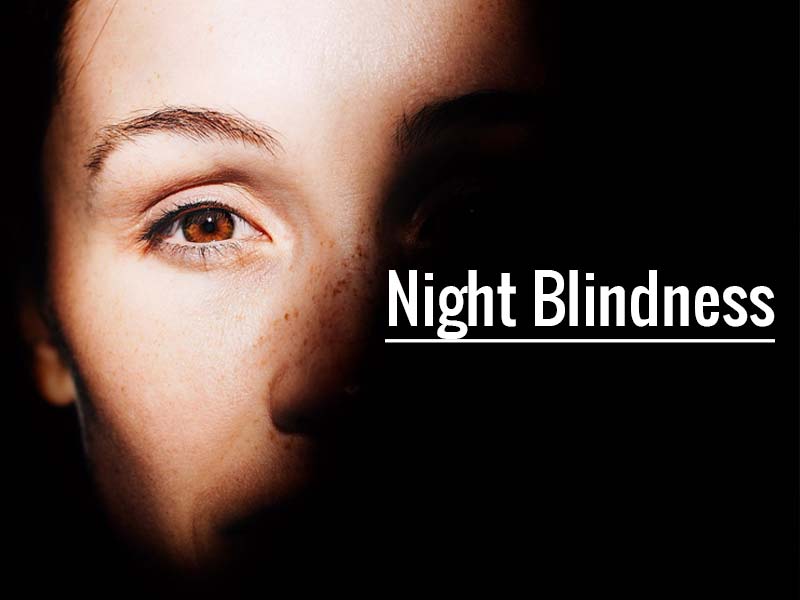
Night blindness is a impairment of vision because of which people are unable to see clearly in the night. This may look weird to some people but due to mechanical functioning and structure of eyes, there are few problems that may only arise in darkness or night. This is not harmful or has any adverse affect on the rest of the body but it can hamper your vision and can result to decline in eye health. Today, we will try to know about this problem and how does it affect the lifestyle of the person.
Table of Content:-
How Does Night Blindness Occur?
We talked to Dr. Arun Goyal, Eye specialist from Sahara Hospital, Lucknow to tell us about occurrence of night blindness. According to him, night blindness is a vision impairment because of which your eyes are not able to see properly in the low light or night time. This particularly does not mean a person may go blind. Different people experience different sorts of vision impairment in this condition. It can also be caused because of eye condition and diseases which result to night blindness. Most of these conditions are treatable except a few when they are at the stage of total decline.

Causes of Night Blindness
As told by our experts, there are various conditions that may cause night blindness to occur. According to the conditions, the treatment process of remedies can be given. Some major causes of night blindness are as follows-
Cataracts- this is a common problem which affects a lot of people around the world. This is when there is a cloud like formation near the eye lens. Because of the cloud formation, the person is not able to see clearly in low lighting conditions or things may appear blurred.
Nearsightedness- This is a clear condition of blurred vision, in this condition a person may have problem looking at faraway objects. In advance form of the nearsightedness, it may result to night blindness.
Usher Syndrome- This is a genetic condition in which affect vision as well as hearing. This condition can be very problematic because some other vision problems and hearing aids does not come to use in this syndrome.
Retinitis Pigmentosa- The name does look very complex but it is a simple condition in which there is a dark pigment formation that occurs on your retina. This dark pigment results to blurred vision and creates a tunnel vision that becomes more problematic in the night.

Risk factors Of Night Blindness
There are couple of risk factors that can increase the risk of having night blindness in the person. These conditions are as follows-
1. Being older- As the age increases, the risk of having cataracts and vision problems increases. Older people start having problems with eyesight, especially nearsightedness. You must have seen older people having lens and glasses for reading. This is a basic risk factor which always remains with night blindness.
2. Vitamin A deficiency- Deficiency of vitamin A can actually cause a problem because of lack of nutrition that gets to the eyes. Eye health becomes affected which can lead to night blindness in a couple of months, if correct treatment and diet are not restored.
3. Pancreatic insufficiency- This type of problems in the body can grow and affect different body functions including eyes. People who have cystic fibrosis have difficulty in absorbing fat because of which vitamin A does not reach the eyes and increases risk of night blindness.
4. People with high blood glucose levels or those who have diabetes are also at high risk of developing night blindness and problems such as cataracts which further lead to night blindness.
Also Read-What Are Eye Floaters? 5 Methods By Expert To Treat This Condition
Tips to Prevent Night Blindness
Here are some tips given by expert to help prevent night blindness and problems associated with it. By following these tips you can reduce the risk of eye problems including night blindness to upto 40 percent.
1. Have a very balances diet that is rich in antioxidants, vitamins and minerals. Have fruits and vegetables that increase the amount of vitamins in the body.
2. Have some fruits such as sweet potatoes, cantaloupes, carrots, pumpkin, mangoes, etc once in a day.
3. Wash your eyes at regular intervals to avoid dust particles and microorganisms to infect your eyes.

4. Make use of eye drops in case you feel itching, irritation or redness in eyes. Eye drops need to recommend by doctor so that it is ensured it is soothing to the eyes.
Also Read- World Stroke Day 2021: 7 Myths And Facts About Stroke You May Not Know
5. Do not rub the eyes often; it can cause damage to the lens as well as pupil in some cases. Rubbing of eyes are associated with a number of eye problems.
6. Wear sunglasses in harsh sunlight to protect your eyes from harmful UV rays. Have dark sunglasses that can prevent eye from getting infected.
7. Go for eye-check up once in 2 months or whenever you feel redness or continuous itching in eyes. Do not neglect anything related to eyes and avoid taking home remedies without proper knowledge about the remedy.
8. Take proper rest and sleep for the eyes to recover and work efficiently. People who take proper rest are less likely to have night blindness or eyesight problems.
Read More Articles on Other Diseases
Picture Credits- Pexels.com
Also watch this video
How we keep this article up to date:
We work with experts and keep a close eye on the latest in health and wellness. Whenever there is a new research or helpful information, we update our articles with accurate and useful advice.
Current Version